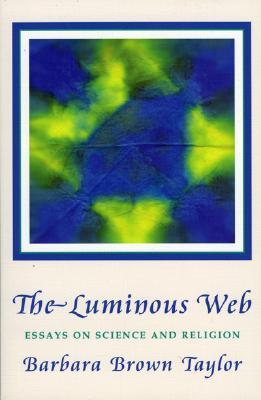I just finished reading The Luminous Web by Barbara Brown Taylor. This is the fourth book I have read by Taylor, and although it is not her best-known work, I think this short essay collection is very fine. Admittedly, my praise of the book comes out of my deep interest in the intersection (or polarization) of science and religion. Most scientists will not find it as compelling as those who are sympathetic to religious belief or even spirituality. Published in 2000, the book is perhaps somewhat dated now, but the principle thesis and the keen observations are still perfectly relevant. Taylor is a priest and a professor of religion with a sincere interest in science, which places her in good company with some of the greatest minds in history, going back to the Middle Ages with Thomas Aquinas and up to the 20th century with people like Pierre Teilhard de Chardin, who was both a priest and a scientist. I think Rev. Dr. Taylor believes in and is always searching for what Teilhard de Chardin named the “Omega Point,” that evolutionary conclusion where God and the physical universe are united, or as some have phrased it, a “divine unification.” To Taylor, God is not superseded by science nor is God made irrelevant by the scientific method. She clings to the idea that science and religion are equally in pursuit of the truth — the former in its exploration and explanation of the physical universe and the latter in its attempts to find meaning and purpose.

I have been reading popular books on science and religion for about thirty years. I am drawn to authors who tend to challenge or even shatter long-held assumptions about religion, mainly Christianity since that is the faith of my heritage. In addition to Barbara Brown Taylor, a few that come to mind are Marcus Borg, John Dominic Crossan, Bart D. Ehrman, Philip Gulley, and James Mulholland. In recent years I have also been reading books by the modern atheists and humanists, like Carl Sagan, Stephen J. Gould, Richard Dawkins, Christopher Hitchens, Greg M. Epstein, Edward O. Wilson, Eugenie C. Scott, and Jerry A. Coyne. All of these writers have addressed the friction created where science and religion meet.
I certainly have issues with organized religion, although I am a member of the Episcopal Church. I am repelled by evangelical Christianity, fundamentalist factions across the globe, radical sects of all faiths, and any religious practice that results in division, discrimination, sexism, racism, and superiority. At the same time, I cannot agree with some of the modern atheists who have decided that all religion is superstitious nonsense with no purpose, no value to humanity. Some of these scholars claim that religion is not just a benign fantasy but a dangerous threat to the survival of humanity. To judge religion based on the manner in which it is too often adulterated by immoral clergy, zealots, dictators, and politicians, to my way of thinking, is similar to faulting science when technology is used by power-hungry leaders to make weapons of mass destruction.
Some scientists posit that, since the beginning of the Enlightenment, science has been rapidly replacing religion as a unified explanation for all existence. In other words, we don’t need religion anymore. As much as Dawkins and others have tried to make the case of science’s ability to answer all our questions, I believe there will always be significant gaps. My argument for the existence and validity of religion is primarily built on its longevity, that it has been a hallmark of hominids at least as far back as the Neanderthals. Evolutionary theory teaches us that nature selects what will and will not survive based on characteristics such as fitness, adaptability, necessity, and the ability to pass on vital information from one generation to the next. It works for genes, language, technology, and yes, religion. Humans have passed down faith and myth for thousands of years, not because they are entertained by them, but because they need them.
As contemplative animals who are consciously aware of their existence, their past, and their possible future, humans have evolved a thirst for answers to questions about our place in the universe, how it all began, and the meaning of life. But, we also need a practice to help us appreciate and absorb emotion, beauty, and a whole host of other experiences. Sometimes science falls short, not because of what is yet undiscovered, but because so many people need the most treasured part of life to remain a mystery. Is religion nothing more than a panacea? Is it “the opium of the people” as Karl Marx observed? Is it a vestige that we will eventually slough off like dead skin? I suppose it’s possible, but I don’t think that we will see that next stage in our evolutionary development nearly as soon as some of our atheist friends are predicting.

